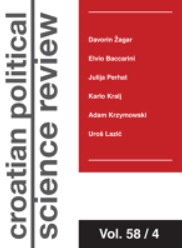OD JEDINE PARTIJE DO STOŽERNE STRANKE: KONTINUITET ZAROBLJAVANJA DRŽAVE U HRVATSKOJ
FROM THE ONLY PARTY TO THE CENTRAL PARTY: THE CONTINUITY OF STATE CAPTURE IN CROATIA
Author(s): Domagoj RačićSubject(s): National Economy, Political history, Economic policy, Government/Political systems, Politics and society, Comparative politics, Post-War period (1950 - 1989), Transformation Period (1990 - 2010)
Published by: Fakultet političkih znanosti u Zagrebu
Keywords: State Capture; Clientelistic Network; Rent-extracting; Political Legitimation; Socialism;
Summary/Abstract: The article seeks to analyse clientelistic practices in Croatia and to determine the elements of (dis)continuity between these practices and the related practices in socialism. We define clientelism as the conditional exchange of political support, influence, and goods within a network, aimed at the achievement of political hegemony and selective distribution of material benefits. Clientelistic networks are reproduced through rent-extracting instruments, which bring larger benefits to their core, and through political legitimation instruments, which distribute smaller benefits to wider segments of the electorate that support hegemonic power. The first group consists of personnel policy and management of material resources in the public sector and instrumentalization of public institutions, whereas the second group comprises social policy and ideology. State capture in Croatia has some roots in socialism. This applies to the personnel policy in the public sector, instrumentalization of public institutions and ideological legitimation of the system. But the markets and private property were then limited in scope, and social policy aided by an egalitarian ideology distributed some benefits of economic development. The shift towards a multi-party system and market economy in the context of war, state independence and dysfunctional institutions has strengthened existing mechanisms of state capture and encouraged the formation of new ones.
Journal: Politička Misao
- Issue Year: LVIII/2021
- Issue No: 03
- Page Range: 39-76
- Page Count: 38
- Language: Croatian

